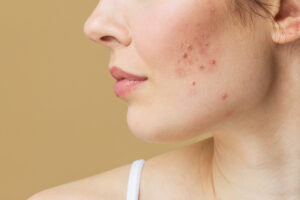Painful pustules, blackheads, and deep cysts that develop during adulthood are often attributed to hormonal and genetic factors. Hormonal acne is more predominant in women, thanks to fluctuations in estrogen, androgens, and progesterone during monthly cycles and pregnancy. These breakouts are usually inflammatory in nature and can be challenging to treat with over-the-counter products.

Causes of hormonal acne
Fluctuating hormones cause the sebaceous glands to produce more sebum. This oily substance accumulates with environmental pollutants and bacteria, clogging the pores. Typically, breakouts occur on the lower third of the face and are most prominent just before the menstrual cycle, when testosterone levels rise.
Another culprit of hormonal acne is Polycystic Ovary Syndrome (PCOS). This condition is most common during a woman’s reproductive years. It causes a hormonal fluctuation that increases the intensity and duration of menstrual cycles, resulting in painful breakouts along the chin, cheeks, and jawline.
Worsening of hormonal acne can also occur during perimenopause and in women taking progestin-based oral contraceptives. This adult-onset acne takes many forms and can develop as papules, pustules, blackheads, whiteheads, and deep cysts.
Treatments for hormonal acne
There are a variety of options for treating hormonal acne. Dermatologists may recommend any of the following therapies to get periodic breakouts under control:
- Reduce stress as it triggers the body’s inflammatory response. Inflammation is usually the root of most hormonal acne
- A healthy sleep routine is important as it helps the body restore and ensure hormonal systems are properly functioning
- Use a preventative skincare routine that incorporates retinoids and alpha hydroxy acids to promote skin cell turnover and prevent pores from being clogged with dead skin cells, sebum, and debris.
- Take oral contraceptives that work to balance hormones and decrease androgen levels or prescription medications that mitigate the effect of androgen hormones on the sebaceous gland
- Consider dietary changes. Research has shown that dairy products and refined foods that are high in sugar can cause androgen or insulin levels to spike, resulting in inflammation and excess oil production
- Pay attention to gut health by taking a quality prebiotic or probiotic supplements
When to see your dermatologist
If at-home regimens have failed to produce any measurable improvements or your breakouts are getting worse, it’s time to see a dermatologist who can evaluate your skin and determine the best acne treatment options.
Our doctors will assess numerous factors to formulate a personalized treatment plan, including the severity of your acne, reactions to previous treatments, skin type, and candidacy for prescription medications. Some patients may also benefit from chemical peels and phototherapy to curb hormonal acne.
Ready to discuss hormonal acne treatment options that are tailored just for you? Schedule a Dallas dermatology appointment today.
